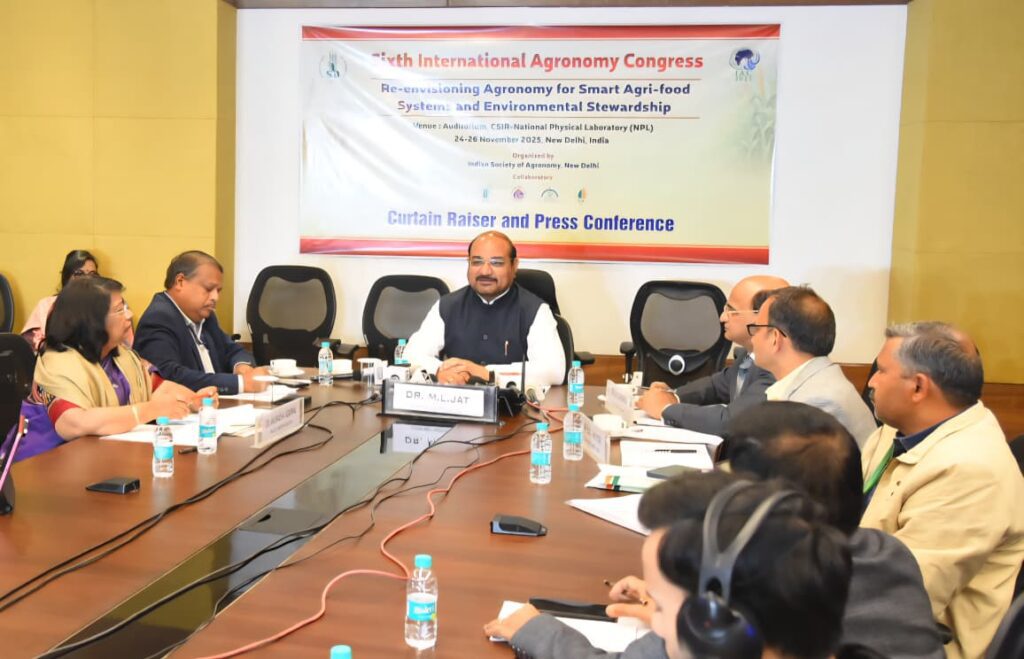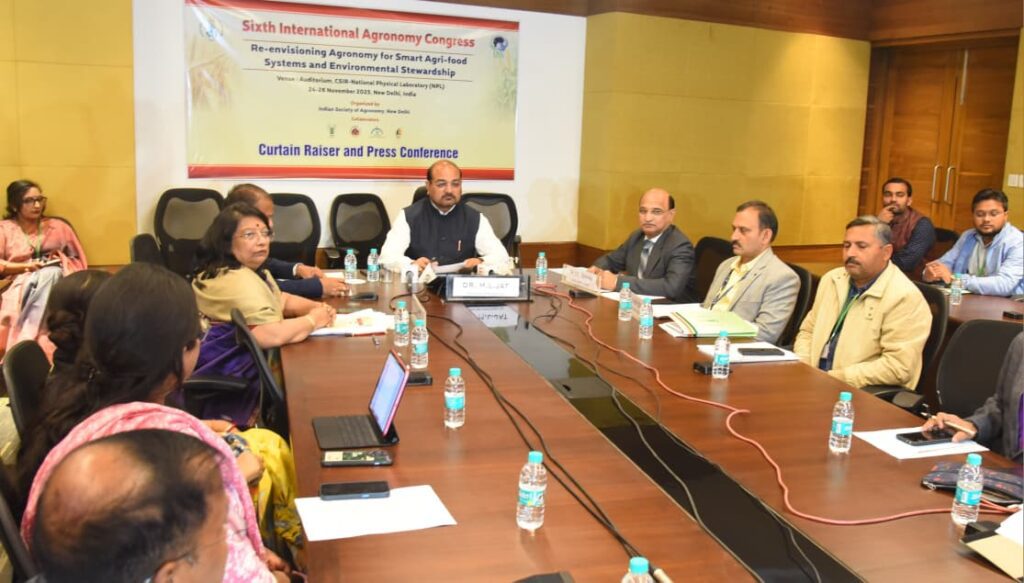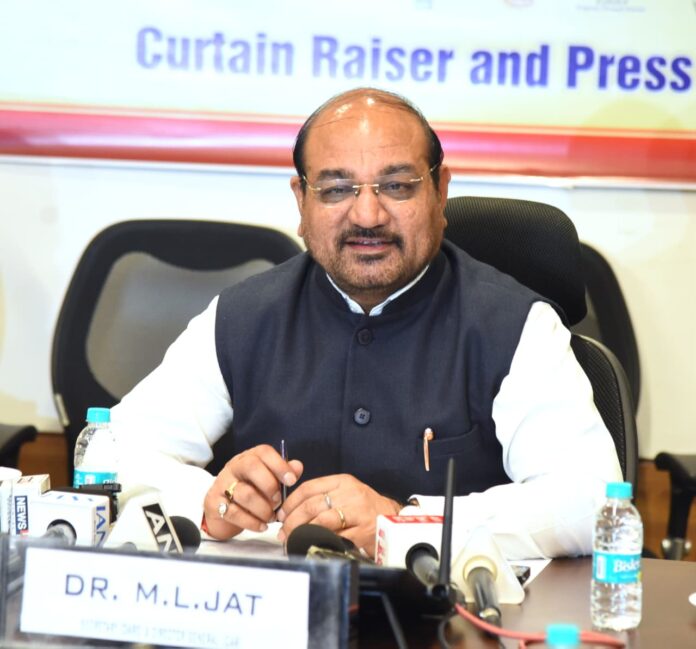New Delhi, November 22, 2025: The curtain raiser for the 6th International Agronomy Congress (IAC)-2025 was held at Agni Hall, NASC Convention Centre, New Delhi, bringing together senior leadership from ICAR, the Indian Society of Agronomy, scientists from IARI, and delegates from major media houses. The event served as a formal introduction to the upcoming three-day event and provided a platform for highlighting the significance of agronomy in addressing the emerging challenges in the agriculture sector.

Dr. S.K. Sharma, President of the Indian Society of Agronomy, opened the program by welcoming all dignitaries and participants. He briefly outlined the structure of the IAC, its thematic sessions, and the scope of deliberations planned. His remarks emphasized the importance of such scientific platforms for knowledge exchange, policy influence, and strengthening agronomic research in India.

Dr. M.L. Jat, Secretary DARE and DG, ICAR, delivered a comprehensive scientific briefing that set the tone for the IAC. He began by sharing encouraging news on India’s agricultural performance, noting that the nation has achieved a record food grain output of 357.73 million tonnes. This milestone reflects rising productivity and steady gains in pulses and millet production, supported by technology adoption and focused government initiatives.
Dr. Jat emphasized that in the IAC theme “Re-Envisioning Agronomy for Smart Agri-food Systems and Environmental Stewardship” the two key concepts, agri-food systems and environmental stewardship; play a vital and defining role, as agri-food systems encompass the entire value chain from production to consumption, while environmental stewardship focuses on protecting soil, water, and biodiversity for long-term sustainability. He stated that this theme is both timely and futuristic, capturing the emerging global needs of resilience, efficiency, and ecological responsibility, and he applauded the Sixth IAC for adopting such a futuristic and transformative direction for the field of agronomy.
He also underlined the significant reduction in crop residue burning, an impressive 95% decline since 2020, achieved through effective policy support, expanded machinery availability, and greater awareness among farmers. Additionally, he mentioned the positive export trends in the April–September assessment of agricultural trade, highlighting India’s increasing competitiveness in global markets.
Referring to a recent message by the Hon’ble Prime Minister in Coimbatore, he stressed the dual role of conserving and simultaneously utilizing biodiversity to build resilient future farming systems. According to him, the IAC will bring together participants from diverse disciplines and nations, offering an opportunity to co-create a long-term roadmap for “Viksit Bharat,” guided by innovation, synergy, and integrated planning.
He also mentioned that the theme and sub-themes of the Sixth IAC have been thoughtfully crafted to address the country’s emerging agricultural needs and strengthen the path toward self-reliance. He remarked that the IAC is aligned with national priorities and will generate insights that directly support Viksit Krishi, thereby contributing significantly to the broader vision of Viksit Bharat.
Dr. Jat further discussed the significance of emerging sustainable paradigms such as natural farming, organic farming, and regenerative agriculture, noting that these approaches promote long-term soil health, carbon enhancement, and ecological resilience.
A major concern highlighted by Dr. Jat was the yield gap that persists in Indian agriculture. He argued that system agronomy offers a powerful approach to bridging these gaps while reducing environmental harm. He urged scientists to practice genuine interdisciplinary collaboration, stating that collective scientific efforts should not merely add up but multiply in impact.
He also emphasized the growing relevance of data-driven agronomy, citing the importance of the Internet of Things, big data analytics, artificial intelligence, and machine-learning tools for modern decision-making. He pointed out that young researchers will be central in shaping these digital transformations and translating them into field-scale solutions.
He indicated that inputs from the IAC would play a pivotal role in shaping future agricultural policies, and he assured the audience that recommendations emerging from the event would be compiled and published within three days of the conference, enabling timely integration into national planning and action frameworks.
The issue of self-reliance in agricultural inputs received special attention in his address. He stressed the urgency of reducing dependence on imported fertilizers by exploring indigenous raw materials, enhancing nutrient use efficiency, and promoting the use of soil microbes. Crop diversification, especially away from fertilizer-intensive crops, was highlighted as an important strategy.
He also reminded the audience that crop residues remain a major untapped resource, particularly as a natural source of potassium, and must be integrated effectively into nutrient management practices. Expressing appreciation for the role of media, he acknowledged how media houses help bring farmers’ issues to the forefront, promote success stories, and accelerate the adoption of beneficial technologies.
The event also included an interactive session where delegates raised questions about farmer participation, international representation, and the structural details of the IAC. They also offered constructive ideas for improving outreach and ensuring greater inclusivity. Dr. Jat responded with clarity, reiterating that the event is designed to bring together a wide range of stakeholders and that its outcomes will contribute directly to shaping future agricultural action agendas.
The program concluded with a vote of thanks by Dr. S.S. Rathore, Organizing Secretary of the 6th IAC. He expressed gratitude to all dignitaries, scientists, and media representatives for their presence and contributions. He urged media houses to provide extensive coverage of the IAC to ensure that its scientific discussions, policy recommendations, and innovations reach farmers, policymakers, and citizens across the country.
Dignitaries in Attendance
Dr. M.L. Jat, Secretary DARE & Director General, ICAR, New Delhi
Dr. S.K. Sharma, President, Indian Society of Agronomy, New Delhi
Dr. S.S. Rathore, Organizing Secretary, 6th IAC & Head, Agronomy, ICAR-IARI, New Delhi
Dr. Anuradha Agrawal, Project Director, DKMA, ICAR, New Delhi
Dr. P.S. Brahmanand, Project Director, Water Technology Centre (WTC), ICAR-IARI
Scientists from the Division of Agronomy, IARI
Representatives and correspondents from leading media organizations
The curtain raiser thus successfully set the stage for a meaningful and impactful event aimed at building a prosperous, resilient, and self-reliant agricultural future for India.

